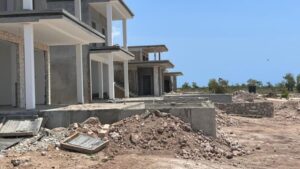Washington — The World Bank Group’s Board of Executive Directors has endorsed the new Country Partnership Framework (CPF) for Tanzania to support the country in consolidating its status as a middle-income country, achieving a high level of human development, and contributing to the World Bank Group’s (WBG) mission to end extreme poverty and boost prosperity on a livable planet.
The new strategy maximizes the impact of the One-WBG approach, coordinating and leveraging the strengths of the International Development Association (IDA), the International Finance Corporation (IFC), and the Multilateral Investment Guarantee Agency (MIGA) in the country over the period FY2025 to FY2029.
The new CPF prioritizes several key areas. First, it aims to support the country’s human development agenda. This includes providing transformative support in education, healthcare, water, sanitation, and hygiene (WASH) services, and shock-responsive social protection programs, building upon the strong momentum already established by the Tanzanian government.
Secondly, the CPF will bolster the government’s goal of fostering a better environment for private sector-led growth. This will involve deepening support for reforms that strengthen the business climate, investing in infrastructure and connectivity to facilitate economic activity, and modernizing Tanzania’s productive sectors. Additionally, the CPF aims to leverage the country’s strategic geographic location to promote inclusive growth both domestically and throughout the sub-region.
Finally, the CPF will support Tanzania’s crucial and multi-prong resilience agenda, focusing on climate change adaptation and mitigation strategies, alongside efforts to strengthen the country’s economic resilience. Progress toward these objectives is underpinned by two cross-cutting priorities: increased empowerment of women and youth and improved government effectiveness with more efficient, transparent, and accountable institutions.
“We have seen tremendous progress with recent policy changes, such as increasing access to education for all girls coupled with broader reforms such as vocational training,” said Nathan Belete, World Bank Country Director. “Girls and boys now have multiple pathways to complete their secondary education and the Fee-free Basic Education Policy has had an incredible impact, opening doors for 4.5 million new students. With such renewed commitment to human development and inclusion by the government, the outlook for inclusive growth and poverty reduction is favorable.”
The CPF is informed by extensive consultations with a wide range of stakeholders as well as a country opinion survey and is aligned with the priorities identified in Tanzania’s Third Five-Year Development Plan and Zanzibar’s Five-Year Development Plan. The CPF’s focus on private sector-led growth is consistent with IFC’s Creating Markets Strategy which aims to support conditions for private enterprises to efficiently contribute to inclusive development.
“Private sector participation is critical to any economy’s growth and development. To address Tanzania’s development goals, including poverty reduction and job creation, the country has an opportunity to further leverage private sector-driven economic growth. IFC will continue to work closely with our public and private sector partners, as well as with our colleagues across the World Bank Group, to unlock the conditions needed to further support inclusive finance, agribusiness, manufacturing, and sustainable infrastructure through investments, advisory and upstream support,” said Mary Porter Peschka, IFC’s Regional Director for Eastern Africa.
“In recent years, MIGA has seen a significant increase in investor interest in Tanzania, thanks to reforms undertaken by the government,” said Șebnem Erol Madan, Director of Economics and Sustainability at MIGA. “As part of the new CPF, MIGA will continue to support financial inclusion and climate finance initiatives and will leverage the new World Bank Group guarantee platform to support the country in attracting and mobilizing private capital in other sectors, including renewable power and digital.”
The CPF builds on a well-performing WBG portfolio in the country. Through the CPF 2018-2022, the World Bank provided over $9 billion dollars of financing that delivered important improvements for Tanzanians, such as:
- Increased access to safe water for nearly 4.7 million people which helped reduce the disease burden and improved school attendance and completion rates, particularly for girls.
- Improved secondary education benefiting 2.7 million students, especially girls, by providing better-equipped secondary schools. Additionally, technical and vocational education enrollment tripled and 64% of female graduates found employment.
- Expanded access to electricity for 7.9 million people in rural areas, which enhanced their livelihoods, health, and learning opportunities.
IFC’s investment portfolio in Tanzania stands at over $400 million with investments focused in key sectors including financial institutions, agribusiness, and real estate. The IFC advisory portfolio reached $11 million in 2024. Over the last few months, MIGA has issued its first political risk guarantees in a decade in Tanzania, with guarantees in the mobile money and banking sectors. As a result, MIGA now has a portfolio of $151 million in the country and a strong pipeline in the renewable energy and digital sectors.
Source: allafrica.com












